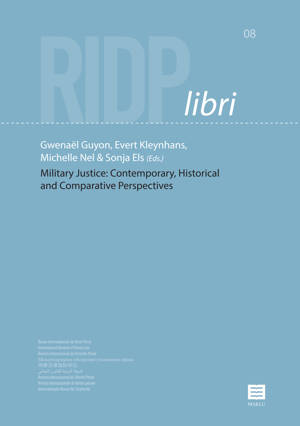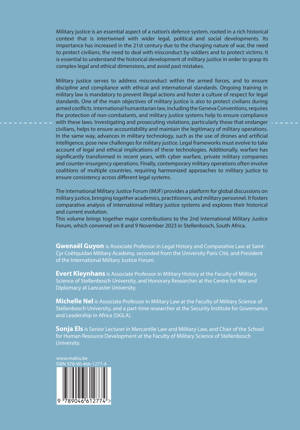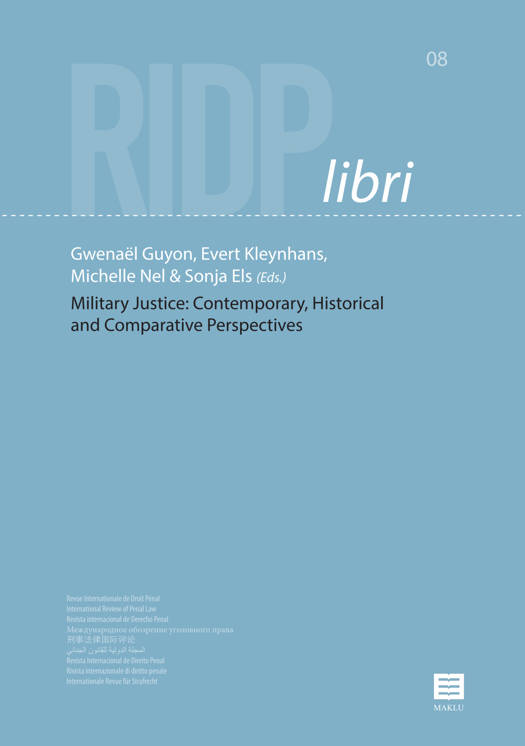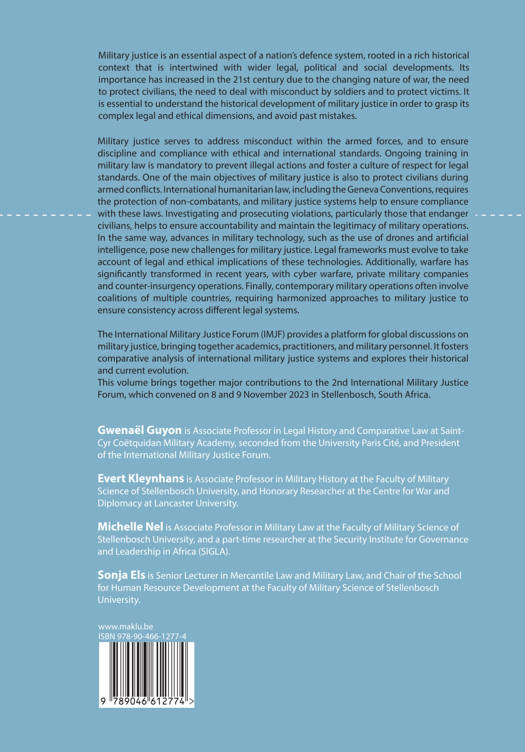
- Afhalen na 1 uur in een winkel met voorraad
- Gratis thuislevering in België vanaf € 30
- Ruim aanbod met 7 miljoen producten
- Afhalen na 1 uur in een winkel met voorraad
- Gratis thuislevering in België vanaf € 30
- Ruim aanbod met 7 miljoen producten


Military Justice: Contemporary, Historical and Comparative Perspectives
2nd International Military Justice Forum Stellenbosch 2023
Gwenaël Guyon, Evert Kleynhans, Michelle Nel, Sonja ElsOmschrijving
Military justice is an essential aspect of a nation’s defence system, rooted in a rich historical context that is intertwined with wider legal, political and social developments. Its importance has increased in the 21st century due to the changing nature of war, the need to protect civilians, the need to deal with misconduct by soldiers and to protect victims. It is essential to understand the historical development of military justice in order to grasp its complex legal and ethical dimensions, and avoid past mistakes.
Military justice serves to address misconduct within the armed forces, and to ensure discipline and compliance with ethical and international standards. Ongoing training in military law is mandatory to prevent illegal actions and foster a culture of respect for legal standards. One of the main objectives of military justice is also to protect civilians during armed conflicts. International humanitarian law, including the Geneva Conventions, requires the protection of non-combatants, and military justice systems help to ensure compliance with these laws. Investigating and prosecuting violations, particularly those that endanger civilians, helps to ensure accountability and maintain the legitimacy of military operations.
In the same way, advances in military technology, such as the use of drones and artificial intelligence, pose new challenges for military justice. Legal frameworks must evolve to take account of legal and ethical implications of these technologies. Additionally, warfare has significantly transformed in recent years, with cyber warfare, private military companies and counter-insurgency operations. Finally, contemporary military operations often involve coalitions of multiple countries, requiring harmonized approaches to military justice to ensure consistency across different legal systems.
The International Military Justice Forum (IMJF) provides a platform for global discussions on military justice, bringing together academics, practitioners, and military personnel. It fosters comparative analysis of international military justice systems and explores their historical and current evolution.
This volume brings together major contributions to the 2nd International Military Justice Forum, which convened on 8 and 9 November 2023 in Stellenbosch, South Africa
Gwenaël Guyon is Associate Professor in Legal History and Comparative Law at Saint-Cyr Coëtquidan Military Academy, seconded from the University Paris Cité, and President of the International Military Justice Forum.
Evert Kleynhans is Associate Professor in Military History at the Faculty of Military Science of Stellenbosch University, and Honorary Researcher at the Centre for War and Diplomacy at Lancaster University.
Michelle Nel is Associate Professor in Military Law at the Faculty of Military Science of Stellenbosch University, and a part-time researcher at the Security Institute for Governance and Leadership in Africa (SIGLA).
Sonja Els is Senior Lecturer in Mercantile Law and Military Law, and Chair of the School for Human Resource Development at the Faculty of Military Science of Stellenbosch University.
Specificaties
Betrokkenen
- Auteur(s):
- Uitgeverij:
Inhoud
- Aantal bladzijden:
- 361
- Taal:
- Engels
- Reeks:
- Reeksnummer:
- nr. 8
Eigenschappen
- Productcode (EAN):
- 9789046612774
- Verschijningsdatum:
- 13/01/2024
- Uitvoering:
- Paperback
- Afmetingen:
- 170 mm x 240 mm

Alleen bij Standaard Boekhandel
Beoordelingen
We publiceren alleen reviews die voldoen aan de voorwaarden voor reviews. Bekijk onze voorwaarden voor reviews.










